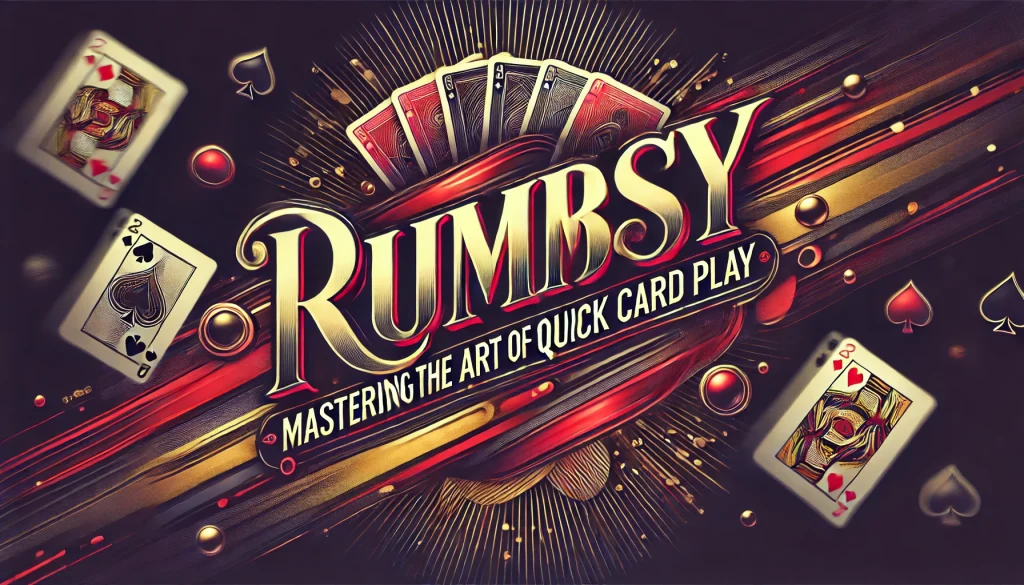Rummy Fast: Mastering the Art of Quick Card Play

A Complete Guide to Mastering Rummy Quickly Rummy is a timeless card game that has enthralled players for many years. For both serious competitors and casual players, its combination of skill, strategy, and a little bit of luck makes it an entertaining past time. Anyone hoping to succeed in this fast-paced game must grasp the fundamentals of rummy. Fundamentally, rummy is about using the cards that are dealt to each player to form sets and runs.
Three or more consecutive cards of the same suit make up a run, whereas three or four cards of the same rank but different suits make up a set. The goal is to combine every card you have into a legitimate combination before your rivals do. For optimal gameplay, it is essential to be familiar with the rules, which include how to draw and discard cards. Players must understand the subtleties of gameplay, which can have a big influence on their performance, in addition to the rules. Playing rummy involves more than just luck; it also calls for flexibility and strategic thinking.
Players need to be mindful of the cards they discard & pick up because these decisions can give their opponents important information. The success of a player can be significantly impacted by their comprehension of the game’s flow, which includes knowing when to hold onto & release specific cards. Players can start investigating more complex tactics that will improve their speed and efficiency in the game as they get more accustomed to the fundamental mechanics. Making decisions quickly is crucial when playing rummy. Players frequently have to evaluate their hands and make decisions in a matter of seconds as the game progresses quickly.
Players should practice quickly weighing their options in order to improve this skill. This entails anticipating possible moves from opponents in addition to taking into account the cards at hand. The ability to swiftly assess the circumstances and make well-informed choices will give a player a major edge over those who hesitate or doubt their choices. Players can improve their skill by practicing frequently, which will make them more nimble players.
By mimicking high-pressure situations, players can also improve their decision-making skills. Setting personal goals or playing timed games can simulate competitive play. Players can develop their ability to think quickly by putting themselves in situations where they must make snap decisions. Players gain confidence from this exercise, which also teaches them to follow their gut. Making decisions quickly becomes instinctive over time, enabling players to concentrate more on strategy & less on game mechanics.
Rummy card organization that works. Quick & effective rummy play depends on effective card organization. A well-organized card arrangement system makes it simple to access and identify possible combinations quickly. Sorting cards first by suit and then by rank within each suit is a popular technique. Keeping track of discarded cards & organizing them visually.
Players don’t have to search through their entire hand to find potential runs & sets thanks to this visual organization. Also, maintaining a record of which cards have been thrown away can help with future choices regarding which cards to keep or discard. During gameplay, you can use this information to make better decisions. Using color coding & mental organization.
Using mental markers or color coding for various combinations is another useful tactic. Players may, for example, mentally divide cards into those that could finish a set and those that are almost ready to form a run. Because they can quickly determine which cards are the most valuable at any given time, players can make decisions more quickly during gameplay thanks to this mental organization.
Adaptable Systems for Increased Productivity. Players can improve their speed and efficiency by creating a customized system that suits them, which frees them up to concentrate on strategy rather than becoming bogged down by chaos. Players are able to focus on the game & make better choices as a result, increasing their chances of winning. Gaining proficiency in quick card combinations is crucial for winning at rummy, particularly in games that move quickly and every second matters. As soon as players receive their cards, they should begin practicing identifying possible melds.
This entails not just figuring out obvious combinations but also taking into account less obvious ones that might work out as the game goes on. Players’ chances of winning increase when they can adjust their strategies on the fly due to the ability to see multiple possibilities within a hand. Players can perform exercises that emphasize quick combination recognition to further improve this ability.
To find as many valid sets & runs as they can in a set amount of time, they could, for instance, set a timer. This technique enhances speed while reiterating how crucial flexibility is to gameplay. Players will find that they make quicker decisions during actual games as they get better at spotting combinations quickly, which will ultimately improve performance.
When trying to increase their speed in rummy, players can greatly benefit from time management strategies. Learning to effectively manage one’s time can be a game-changer because many games are played against the clock or with time constraints. Establishing a routine that involves evaluating the hand, thinking through possible moves, and effectively carrying out decisions is one strategy. Players can reduce wasted time & keep a constant pace throughout the game by developing an organized procedure.
Players should also pay attention to how their opponents manage their time. Seeing how fast other people make decisions can reveal information about their methods and mentalities. An opponent may be displaying uncertainty or indecision if they routinely take longer than is necessary, which could be strategically exploited. Players can take control of their own gameplay and create opportunities for themselves by combining personal time management with an awareness of opponents’ pacing. One of the most important rummy skills that can greatly affect a game’s outcome is anticipating your opponent’s moves.
Players should observe carefully which cards other players pick up & discard because these actions reveal important information about their strategies and possible hands. Players can infer which cards might be advantageous or disadvantageous to their own hands by examining trends in opponents’ behavior, such as which suits they appear to favor or which ranks they are keeping. Also, it takes experience and practice to develop this skill. To experience different playing styles & tactics, players should play games with a variety of opponents. They will eventually improve their ability to decipher subtle clues and make move predictions based on past behavior.
In addition to improving gameplay on an individual basis, this increased awareness promotes a deeper comprehension of the dynamics of the game overall. enhancing the environment in which you play. Making sure the playing area is free from distractions can help players make decisions more quickly and make fewer mistakes, whether they are playing in person or online. Mindfulness’s Power.
Playing with mindfulness is another crucial component. Players should avoid dwelling on past errors or potential outcomes in favor of trying to stay in the present. This mental clarity makes it possible to react more quickly & judge the game state more precisely. Developing Clarity of Mind.
With the aid of methods like deep breathing or visualization, players can develop this mindfulness and approach each turn with increased awareness and clarity. Ultimately, quick card play strategies in Rummy require constant practice. Players should look for chances to play frequently, whether it’s through online platforms that allow them to compete against people all over the world or casual games with friends. Players will be better able to respond quickly and efficiently to a variety of situations the more they are exposed to different scenarios and tactics. After every session, players can also gain from going over their gameplay.
Examining choices made during the game, both good and bad, can reveal important information about where you can improve. Players can improve their skills over time by recognizing patterns in their play and pinpointing instances where speed could have been increased. In the end, this dedication to ongoing development will result in improved rummy skills & a greater capacity for accurate and fast play under duress. In conclusion, learning Rummy quickly necessitates a multifaceted strategy that includes knowing the fundamentals of the game, honing quick decision-making abilities, efficiently organizing cards, mastering combinations, using time management strategies, predicting opponents’ moves, increasing speed and accuracy, and practicing frequently.
Players can improve their gameplay & experience the excitement of Rummy more quickly while honing their overall strategic thinking by concentrating on these areas.
